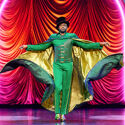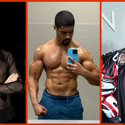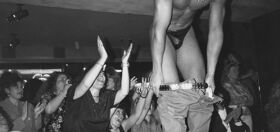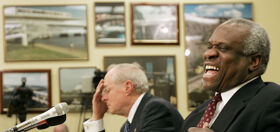
Thomas Pardee is the new gay columnist (or is that “columnist who is gay”?) for RedEye, the Chicago Tribune‘s free, youth-targeted daily. He’s 22 and, as his attack on the push to count America’s gays in the 2010 Census shows, has a lot of growing up to do.
The problem with an attempt to count America’s LGBTs, Pardee argues, is with NGLTF’s Queer the Census campaign, which encourages respondents to send their census form back to the government with one of its pink stickers (sorry, sold out) identifying thesmselves as gay or bi or straight or whatever — all in an effort to point out that despite endless requests, the Census still won’t ask Americans about their sexual orientation. Which means after spending $14 billion asking every person in the country their names, ages, marital statuses, and races, they lost a grand (and wholly inexpensive; just add another checkbox) opportunity to learn about America’s sexual orientation
“It would be an unprecedented new way to stand up and be counted, which many out-and-proud LGBT people are more than ready for,” says Pardee. “There’s just one problem: It’s completely unrealistic. Potentially detrimental, even. Oh, yeah–and it’s impossible. I’m proudly gay, and I relish any chance to self-identify as such, but people like me are not the problem with this proposition. It’s the untold millions of closeted non-heterosexual citizens and their self-denial that make this plan a no-go. Even if this box were to be added to the census, the numbers would never accurately represent how many LGBT people actually live in the United States. In the same way that many closeted politicians support anti-gay policies as another way to cover their glittery tracks, I can imagine millions of quiet queens would leap at the chance to make their self-loathing official with a macho swish of the pen on the ‘straight’ box.”
Except: It wouldn’t really be the “queens” keeping their sexuality at a secret (although some certainly would), but the heads of the household, whom complete the census forms for their families, and might not know or care to share the non-heterosexuality of the other people in their house. (Yes, we are basically saying dad is not going to check “gay” for his gay son, or mark his daughter “trans.”)
How about we take this to the next level?
Our newsletter is like a refreshing cocktail (or mocktail) of LGBTQ+ entertainment and pop culture, served up with a side of eye-candy.
“At best,” Pardee continues, “this would yield much smaller numbers than are representative of our community. How exactly is that helpful?”
It’s helpful because, as it stands, the U.S. government has no official count of Ameriqua. And it needs one. Congressman need to know there are gay families in their districts whose rights need protecting. Medicare needs to know where to devote LGBT-specific health services. Even the U.S. Travel and Tourism Advisory Board could use the data to better market gay destinations to foreigners. Census data gets analyzed, repackaged, and utilized in millions of ways, and having at least a sample of how many queers there are would be useful. (The video above, from NYC.gov/NYU Journalism, portrays how actual people are affected by this data.)

Moreover, while we agree the Census wouldn’t deliver an absolutely accurate count of LGBTs — because of whatever aversions to identify the gays in the house — it would deliver representative data. That is, while you might expect Alabama to be a less gay-friendly place than Vermont, we’re sure statisticians and demographers will tell you that when collected in aggregate, roughly the same percentage of people from across the country will refuse to answer honestly. Which means the Census may report back that only 5 percent of America is gay, when it’s really 8 percent — but the gays will be under-counted by the same ratio across the country. And that data still remains useful. And powerful.
So what’s Pardee’s alternative? He doesn’t have one, because he doesn’t think America’s sexuality should be tallied up. “It’s not particularly helpful, it has a high margin of error, and the potential for the data to be misconstrued or manipulated against LGBT causes outweighs any obvious benefit.” He is wrong, for the same reason collecting data on America’s racial make-up, while apt to be “misconstrued or manipulated,” is still vital.
EARLIER:
• Gays Free to Answer 2010 Census’ Relationship Questions Any Way They Want
• Making Sense of the Cenus: What’s On There For You Homogays



















fredo777
Color me naive, but I thought all this time that sexual orientation was part of the census recently, especially since there seemed to be an interest in gays filling them out this year. Also, I thought I had heard some mention of the census asking about gay partners. Maybe I was just imagining things. It happens.
rf
@fredo777: On the census form, two people in a household can identify as male/male or female/female and check that their relationship is husband/wife. Previously when people did this the Census changed their answer –presumably turning one of them into the opposite sex. The Census has declared that they will be letting SS people identify as married (even if they are civil unioned, domestic partnered, married, or just consider themselves as such) so there will be some recognition of gayness in the census. Other than through that relationship box though, you cannot actually declare that you are gay on the form. Presumably, if you are not in a relationship but live with another gay person, you can check husband/wife to get counted as gay. Some people seem to be writing gay in the race field, some are putting the sticker on their envelops (which to me seem like they just get thrown out with the machine that opens the mail) but neither of these solutions seem to be official or have any chance of being counted.
fredo777
@rf: ah, well, that is enlightening. i seriously had no idea that sexual orientation wasn’t cut + dry a part of the census now. wow, that seriously does suck.
ML
I find this to be a thoroughly unfair interpretation of what Pardee was saying. Not everyone fits into a simple category of gay/straight/bi/les/trans. Why force something as fluid and as personal as sexuality to fit into a neat little box?
Also, I found the argument about how this could be potentially detrimental to the LGBT community very interesting. Funding potentially could be cut because people will argue that there is a lower percentage of queer people than previously thought. It’s hard to argue against hard numbers, even if most of us know that they’re wrong. Like you say, “census data gets analyzed, repackaged, and utilized in millions of ways.” Wouldn’t a ‘sample,’ as you refer to it (which actually translates to ‘incorrect data’), just skew the reality of the numbers?
As for an alternative, another Kinsey-style project seems to be the only reasonable answer. Yes, it’s expensive, but I’d rather have close-to-accurate numbers than completely false ones. Diminishing the numbers of LGBT is counterproductive, and that’s what queering the census would do.
mk
What is that expression we’ve been hearing so much lately? “We can’t let the perfect be the enemy of the good”.
Colin
I am annoyed how everyone is saying “We’re being counted”. Well yes we’ve made progress but we’re not all being counted. I’m a single guy, so no luck for me on the census. I got my queerthecensus sticker, but I’ll be marking gay in the other box of race – but agree with RF that this isn’t official and maybe pointless but I just wanted to be counted .
And I don’t know why it’s automatic that the numbers would show lless of our community, it could actually surprise us, call me naive.
CM
I agree with ML’s statement saying that this is an extremely harsh and biased review of Pardee’s article. With the good, comes the bad. Yes, this information could help give a black and white presence to the GLBTQ community. Like this blog said, legislatures can have a rough estimate of the queer presence in their constituency, but at the same time Pardee has a point in saying that it can be used by the right against our community.
Considering the reach of this new blog, it’d be nice if it wasn’t so biased and judgemental towards whatever it’s staff may disagree with.
anonymous #4
I have always lived with the belief that my sexual orientation is no ones business but mine. I do not approve of this at all.
Taylor Siluwé
Anonymous #4
of course you would feel that way. Anonymous people usually do.
For the census I live with a roommate and for our relationship I checked the box, I think, ‘non-married partner’ (Or something like that). To me when it’s two males and thats the box checked, it clearly means gay.
jeffree
Single, dating, coupled up, shacking up?Straight married, gay married, illegally polygymous, trying 2 get divorced? Gay or bi or straight? Multiracial, biracial, uniracial ^^ok, I dont think thats a word^^ or not sure? Intersex? Transitionning?
The big nasty scary problem w/ any questionaire is that we may change the answer depending on whose asking the question. Some people dont want the govt to know theyre lesbian or bi. Some people may say theyre just roommates becuz theyre not married yet. Some people are ashamed of being gay or bi or biracial.
The census cant get good data if we just write in the words we use to describe ourself, & the little checky boxes leave people out. Depending on how u look at it, i live at my parents house, my uncles place and one semester a year I stay at school. Bad example, ok, but i got nothing else. All that will change i hope for me in 2011…..
to figure out the # of LGBTs may not be possible using the census, but thats the only tool we have 2 study our population except 4 randomn samples.
Bottom line dillemma is that people who are LGBTQ or illegal immigrants ect. may be willing 2 be counted if their name isnt attached. But not if that data gets filed along with their exact address, day of birth, or name. Many people dont trust the Feds with that identifable data, wrong or right.
i wish there was an easy solution but i cannot think of one. Sorry !!
Hammar
Those I am sexually interested in usually know what I want and why. Those that are physically avid for my person may enjoy me or not, depends on my urges for them or their gentle powers of persuasion. I am easy. When I think he’s a sympathetic guy or girl, if I have the time I have no problem with sympathy carnality. And in regard of those I am not hot for and who are not genitally aroused by me, we have copulationwise no business together. Shouldn’t be this always so? Must the sexless State know who does whom? For what purpose? For controle? That’s evil. And this is not a safe world. I think the State should keep its distance. I may be easy, but I am also a very private person and I do not want a Big Brother looking over my shoulder to see what’s my sexual preference. Governments are not to be trusted. It is not the decent and kind majority of those that work for the Government that I am worried about, it’s the unavoidable bad apples in the basket that evoke my distrust. No State’s intrusion in my sex life please. No way.
jeffree
@Hammar: that made as much sense as trying to teach a dog to use dental floss!
jason
I’m not entirely happy about the Census asking people about their sexual orientation. The reason is simple: it’s not a level playing field.
Heterosexuality is glamorized, homosexuality – especially male – isn’t. Any attempt to ask people about their sexual orientation will simply produce a vastly skewed set of figures reflecting this social fact. As a result, the concept of “gay” will be minimized and our enemies will be empowered by this minimization.
A good illustration is the man who is biologically bisexually oriented but married to a woman with whom he has had kids. Do you seriously think he will tick the “bisexual” box? Give me a break. Ditto for the closeted homosexually oriented Christian man who in no way, shape or form wants to identify as “gay”. He’s not going to tick the gay box.
romeo
Queerty, you’re right on with your assessment of the difficulty of getting an accurate count of the ACTUAL number of same-sex oriented people in this country. There’s a lot more of us than most people even dimly realize. There’s an old expression that goes something like, “You can’t believe anything you hear and only half of what you see.”
I still think the 30% that can always be counted on to vote our way in the privacy of the voting booth, which would include bi’s wanting to protect their options, is a more accurate figure.
romeo
The plus or minus 50% we’re clocking these days is a testament to the good will we’ve built up. We’re getting there.
Kevin (New Jersey, US)
My partner and I filled out the census as both males, “unmarried partners”. This is something of a count, at least.
Hammar
@ Jeffree
Funny, I carefully read your comment and I am quite certain that you argued for the same thing as I did but differently worded and phrased.
Robert, NYC
Even if there were a provision to check off “gay”, many wouldn’t, so its pointless. I’m sure few gay republicans would be comfortable checking that category either, they believe in the closet of course.
jason
Robert, NYC,
I totally agree with you.
rf
I don’t agree that its pointless at all. First, in a country where policies, money, and laws are directed against lgbt citizens, getting counted and being visible is one of the best, and maybe only, ways to get equal rights. The census is another tool from which to achieve and maintain these equal rights.
Second, right now they are taking a tentative step in counting gays in relationships (see article below). Of course most lgbt are still in the closet and have no incentive to out themselves to the census. But there is an easy excuse if the numbers are small this decade–the form is still confusing, doesnt explicitly count gays. Even if they specifically counted lgbt this decade–too many people are closeted, too many laws against gays.
But the census is very big picture, longterm thinking and planning. 20-30 years after full equality (which could happen in the next 10-15) there will likely be enough young people out of the closet from day one that significant percentages of lgbt will be tracked in the census despite many people still hiding. And when people live in a country where no one is debating gay marriage, you cant be fired for being gay and “gay” has always been on the census (and by always, I mean 30 years which is prehistory for most people), it will be nothing to declare it. Will they get everyone? of course not. but how much gay marriage did we have in 2000? and what will we have in 2020?
http://www.nj.com/news/index.ssf/2010/03/us_census_to_allow_same-sex_co.html